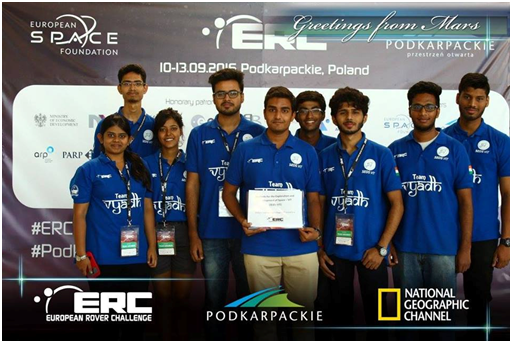It’s human nature to stretch, to go, to see, to understand; Exploration is not a choice really; it’s an imperative.
Curiosity is the essence of human existence and exploration has been part of the human kind since antiquity. The Universe has been and will continue to be a mystery to humans. However, space exploration over the years has seen phenomenal advancement in terms of technology and awareness. Various man-made machines like satellites, space shuttles, rovers, etc have given us a glimpse of what lies beyond and assisted in enhancing life on Earth. As an initiative to spread awareness and encourage scientific minds worldwide to pursue space exploration, several technical competitions are held annually by space organizations.
The European Rover Challenge 2016 is one such space-robotics event, biggest in Europe, and is dedicated to the scientific and business world, the new technology industry and the wide audience. Our team from SEDS VIT Projects, named ‘Vyadh’, took part in the challenge. Just as any mission has a planned sequence of actions, we developed a course of action. Immediately after the problem statement was released, the tasks at hand were divided into sub-categories namely, mechanical, electrical, programming and management.
Along with the documentation requirements like the initial Proposal, Preliminary Design Report, Promotional video and Final Design report, other aspects of our project proceeded parallely. Once the Design Phase was complete successfully, we dealt with a couple of complications in the Manufacturing phase. With the aid of the management department, which handled publicity, editorial and sponsorships, we commendably passed to the Testing Phase from manufacturing and assembling. Now, it was time to face the real challenge.
The Field Challenge-the final round was conducted in Jasionka, Poland from 10-13th September. Out of our team of 19, 9 of us chose to make the trip. On the whole there were 4 major tasks our rover had to perform with particular agendas. The Science task- analyze rock and soil samples; The Maintenance task-operate switches and electrical components mounted on a panel; The Assistance task-deliver an object from one place to another; The Navigation task-blind navigation where rover has to move without any access to visual data. During the competition, we encountered a few technical issues like communication gap between the Ground Control Station and our rover, tilt of chassis, etc which affected our rover’s performance. However, as the famous saying goes, ‘Good things come to those who believe ; better things come to those who are patient and the best things come to those who never give up’, we worked tirelessly on finishing the challenge till the end.

Our rover ‘Vyadh’ secured the 20th position worldwide and the 2nd in Asia. ERC being our debut project of this magnitude, things weren’t easy from the very beginning. Unlike most teams, we had to build our rover from scratch (literally) and had to overcome several issues technically, financially and administratively. But as they say a problem shared is the problem halved, all our setbacks diminished as we worked together as a team. ‘Sheer determination and will in perfect synchrony with passion towards our goal made competing in ERC possible. When the going gets tough, the tough gets going’, proved right in our case. The making of Vyadh: an experience of a lifetime.
Fascination and curiosity of the unknown have fuelled the spark of exploration since ancient times. When this is accompanied by technical expertise and scientific knowledge, truly magnificent feats can be achieved by one and all. ‘To accomplish great things, we must not only act but also dream; not only plan, but also believe.’
Let’s dream and believe and unravel the mystery that is the Universe.
